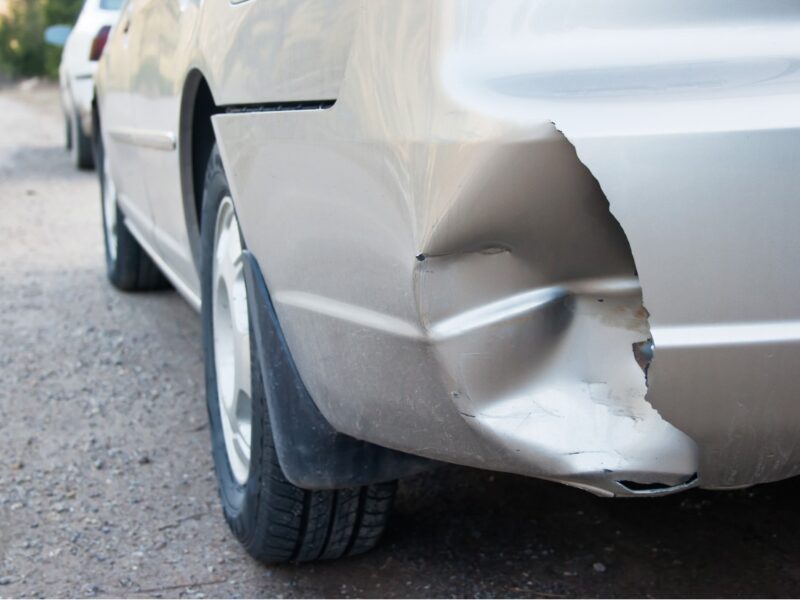A minor car accident, also known as a fender bender, is typically characterized by low-speed collisions that result in minimal vehicle damage and no serious injuries.
Each year, thousands of minor car accidents occur on California roads. While these accidents are thankfully less severe, knowing the correct steps to take immediately afterward is crucial for your own safety, compliance with the law, and potential insurance claims.
What Is a Minor Car Accident?
These accidents often occur in situations like stop-and-go traffic, parking lots, or at traffic lights. Damage from a minor car accident usually involves superficial dents, scratches, or minor bumper damage, and the vehicles involved are often drivable post-incident. There are no serious injuries as a result of the accident.
Safety First
If you’re involved in a minor car accident, your first priority is safety. If the cars are operational and there are no serious injuries, move them to the side of the road to avoid blocking traffic and creating a traffic hazard. Always check on the wellbeing of all parties involved in the accident. If there is any doubt about someone’s health, it’s best to err on the side of caution and call 911 to have paramedics dispatched to the scene. The health and well-being of all parties involved is always the first priority.
Exchange Information
California motor vehicle law mandates that you exchange contact and insurance information with the other driver after an accident. This includes your name, address, driver’s license number, vehicle registration, and auto insurance details. Avoid discussing fault or making any statements that could be interpreted as admitting liability for the accident.
Document the Accident
Use your smartphone to take clear pictures of the accident scene, including all vehicles involved, their positions on the road, and any visible damage. If there are any witnesses, politely ask for their contact information; their statements can be invaluable if there are later disputes about what happened.
Report the Accident
In California, you must report the accident to the DMV if there are injuries, deaths, or property damage exceeding $1,000. Generally, you don’t have to report an accident that caused less than $1,000 of property damage, provided that no one was hurt, no driver left the scene of the accident, and all drivers were licensed. If someone was injured or you believe more than $1,000 in damage occurred as a result of the accident, you should contact the police. They can make an official report regarding your accident, which can help sort out issues with liability and compensation.
Filing a police report is strongly recommended as it provides an official record of the incident, which can be helpful when dealing with insurance claims. Our firm’s attorneys always recommend contacting the police and filing a police report at the scene of the accident. If you have not made a police report at the scene, you should go to the nearest police station to the accident scene as soon as possible after the accident and make an over the counter police report.
Contact Your Insurance Company
Inform your insurance company about the accident as soon as possible. Under California’s fault-based insurance system, the driver at fault is responsible for covering damages, and their insurer typically indemnifies them for these damages. However, determining fault can be complex, and your insurer will typically investigate the accident and then issue its decision on fault. While your insurance company may require you to report the accident, we recommend that you do not provide a recorded or written statement to any insurance company without having your attorney present.
Seek Medical Attention
Sometimes, injuries from car accidents aren’t immediately apparent, and symptoms can develop hours or days later. It’s wise to have a complete medical check-up at a hospital emergency room immediately following an accident, as some symptoms may only become noticeable hours or days later. Doing so will also help document your injuries and symptoms later on should you wish to make a claim for injury. Keeping a record of any medical visits and treatment is important for potential insurance or personal injury claims.
Consider Seeking Legal Advice from A Car Accident Lawyer
If there are disputes about fault, injuries, or significant property damage, it may be wise and beneficial to seek legal advice. A car accident lawyer has specialized knowledge and can offer guidance on navigating insurance claims and ensuring your rights are asserted. At The Hassell Law Group, we specialize in helping clients through the complexities of post-car accident procedures, offering expert legal advice and representation when needed.
Conclusion
Remember, even a minor car accident can have significant implications. By following these steps, you can ensure you are complying with California laws, protect your legal interests, and ensure your own safety as well as other motorists involved in the accident. Always be prepared and consider professional legal advice when navigating the aftermath of a car accident. If you are unsure of anything related to your car accident claim, its best to reach out to a skilled car accident lawyer for help.
We offer California Car Accident Victims a Free Consultation, and there are No Attorney’s Fees Unless We Recover Compensation For You
At The Hassell Law Group, our legal team are experts in car accident law and personal injury law with over 100 years of combined legal experience, and experience matters. We stand up to aggressive insurance companies and have a history of obtaining award-winning results for our clients. We fight every step of the way to achieve the best possible outcome for our car accident clients. We work on a contingency fee basis, which means there is no risk in hiring our law firm.
Contact us today to schedule a free consultation and case evaluation. We welcome your questions, and our legal team looks forward to helping you obtain just and proper compensation for your personal injury claim.
Read next: How much to expect from a car accident settlement.
The general information provided on this website should not be considered legal advice and does not constitute legal advice. For legal advice, you should consult directly with an attorney. If you contact us by telephone, email, letter, or by contact form submission through this website, please note that such communication does not create or constitute an attorney-client relationship. We cannot act as your attorney until we are hired as your attorney by a formal written agreement.


 How Much to Expect from a Car Accident Settlement
How Much to Expect from a Car Accident Settlement